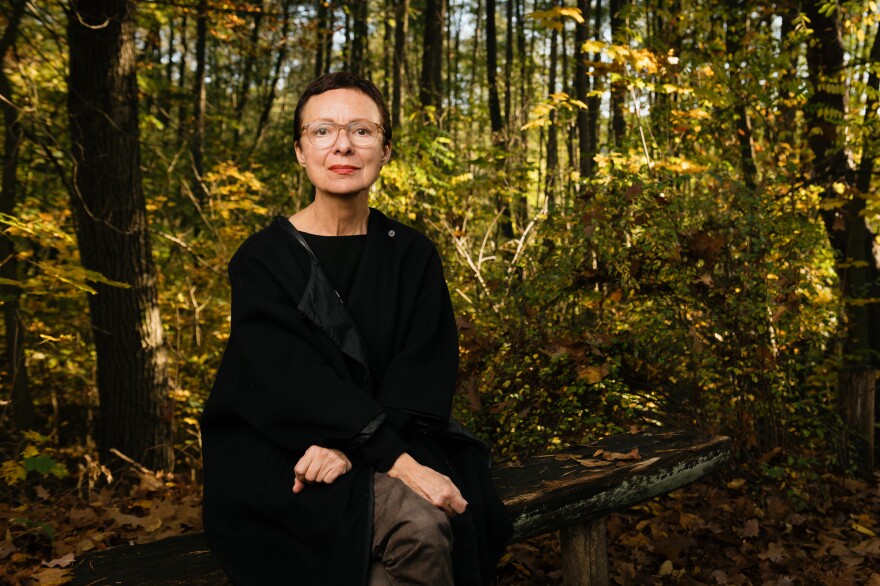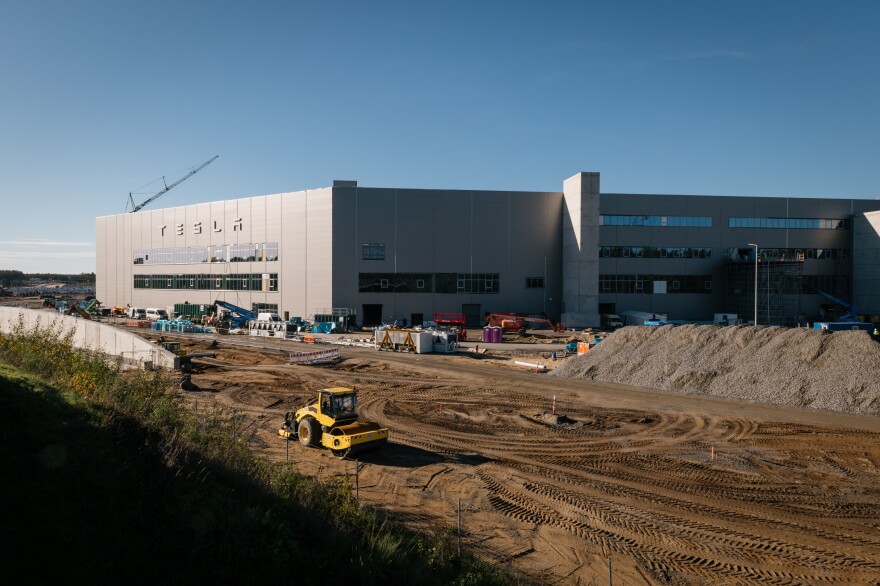BRANDENBURG, Germany — Deep in the pine woods just southeast of Berlin is a massive Tesla factory that opened earlier this year as Europe's first manufacturing outpost for Elon Musk's electric vehicle company.
The site's main facility has the same amount of space as 130 soccer fields, and it is humming with activity, churning out a few thousand vehicles a week.
But Musk's plan to triple the size of the operation is running up against one big problem: The plant is in a drought-stricken part of the country where water is scarce, and it takes a substantial amount of water to do things like paint exteriors, cast vehicle parts and cool heavy machinery.
Tesla's contract with the German government estimates that the expanded factory will use 1.4 million cubic meters of water every year, or roughly the same amount of water that a city of more than 30,000 people would consume.
So, as local leaders and Tesla officials scramble to find enough water to keep expanding the site, already the largest employer in this bucolic slice of eastern Germany, residents are worried about the possibility of a major shortage.
"The water problems are huge," said local activist Thomas Loeb, who is a member of Germany's Ecological Democratic Party. "And it's getting worse. We're getting less and less rain. If Tesla keeps needing more, the people will no longer have any drinking water."
The expansion of the site, officially named Gigafactory Berlin-Brandenburg, is now on hold pending approval from environmental authorities. Tesla officials feel confident an additional build-out will be blessed by regulators, since the company has already started clearing trees in preparation.
But environmental activists and residents are right to be concerned about the strain of the factory's potential increased water demand, even if it pales in comparison to other industries, like coal-fired power plants in the area, said Irina Engelhardt, who heads the hydrogeology department at Berlin's Technical University.
"Due to a decreasing water availability and increasing water demand, there is a mismatch," said Engelhardt, who has pointed out that eventually there might not be enough water for everyone.
Brandenburg's years-long severe drought has created ideal conditions for wildfires to spread. Farmers in the area have reported severe harvest loss as a result of intense heat and the lack of rain, both effects of climate change, according to experts.
The water dispute has prompted lawsuits, and it caused the Tesla plant to delay its opening by six months. But Elon Musk literally laughed off the water problem when asked about it at a press conference last fall.
"This is completely wrong. There is water everywhere here," Musk said. "Does this seem like a desert to you?"

German official: Musk's water comment "not 100% helpful"
Mention Musk's remarks to Brandenburg's minister of economic affairs, Joerg Steinbach, and his eyes widen.
"In terms of the perception in the region, this was not 100% helpful," Steinbach said.
Steinbach was a key figure in enticing Tesla to open a plant in Germany. He said he has long known that building it up to full capacity would mean grappling with local water limitations.
"If you always use the water which is directly under your feet, you always run into that problem of whether it's sufficient for public use as well as industrial use," he said.

Government officials have been scouring the area for new water sources and have drilled wells in Hangelsberg, about 9 miles away from the plant. Steinbach said planners are now installing pipes from the wells to the Brandenburg factory. He would not say when he expects the project to be completed.
Engelhardt, the water expert at Berlin's Technical University, is skeptical that piping in water from another part of eastern Germany will be an enduring solution.
The new wells are "in my mind not a very sustainable and promising solution, as the water scarcity is similar in most parts of Southeast Brandenburg," she said. "I'm afraid there will be a time when a water shortage for some use will be a reality."
The concerns are not just about water, but also preserving trees and sand lizards
Building out the site in Germany is crucial to Tesla meeting its global demand for electric cars. Right now, the factory is making about 2,000 cars a week. Musk hopes to bring that number up to 5,000, but hurdles keep getting in the way.
"It's probably a bit of a culture shock for Tesla, especially for their boss, for their chief executive, Elon Musk," said Matthias Schmidt, a Berlin-based analyst who tracks electric cars in Europe.
It's not just water. Local activists fighting Tesla on everything from tree preservation to saving sand lizards have delayed the timeline.

"It's gotten to the stage with the Tesla facility that these pressure groups are slowing the progress down," Schmidt said.
It is a matter of perspective. Musk complains about delays, but German businesspeople talk about the relatively fast clip of the site's development as moving at "Tesla speed" — which is a sore point for local activists, who say there was not sufficient community input before the sprawling site was approved.
Getting Tesla's German factory operating at full capacity is crucial for Tesla to meet its growth targets in Europe, where about 20% of new cars sold are fully electric vehicles. Last month, European lawmakers reached a deal to ban the sale of new gasoline and diesel cars by 2035. In the United States, California has also pledged to end gasoline car sales by that date.
Tesla, the world's most valuable car company, faces growing competition in the electric vehicle market from Volkswagen, GM, BMW and others. Analysts expect it to double the number of electric vehicles it produces in the coming years, using major plants in Fremont, Calif., and Shanghai, as well as Germany.
German residents on Elon Musk: Messiah or the devil?
Back at his government office, Steinbach notes that in surveys his department has conducted, the majority of residents in the Brandenburg area support the factory, which now employs about 7,000 workers. When the factory is fully built out, the company expects its workforce in Germany to be around 12,000.
But on Musk himself, like in America, people are divided.
"Fifty percent see the messiah in Elon Musk and Tesla. And for 50% it's coming from the devil," he said.

For Heidi Schroeder, a local resident and activist opposed to the site's expansion, the case against expansion is simple: Just stop now to save the local water supply.
"There's already a lack of water. Tesla will need a lot of water," she said. "We do not have this water."
As for Musk himself?
"Go away with your car. We do not want to have you here," she said. "Go to the Mars for instance. That would be beautiful."
Copyright 2024 NPR. To see more, visit https://www.npr.org.









